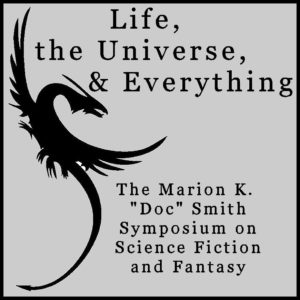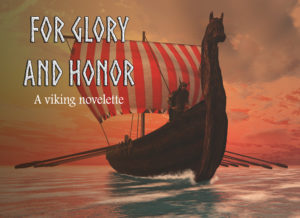 This past weekend I had the opportunity to attend Life, the Universe, and Everything. LTUE is a writing conference that focuses on science fiction and fantasy. This was my first writing conference, so I was naturally giddy with anticipation.
This past weekend I had the opportunity to attend Life, the Universe, and Everything. LTUE is a writing conference that focuses on science fiction and fantasy. This was my first writing conference, so I was naturally giddy with anticipation.
It did not disappoint.
I only attended Saturday (because work), but I made the best of it. Aside from spending one hour playing board games at the game room, I was in classes all day. Expert panels, key note speakers, and lectures is what it was all about. While I feel comfortable with my writing at this stage in my writing career, I know there is still so much I don’t know. These classes were very helpful.
I took classes with topics about everything from writing steampunk to understanding mental illnesses (which was fascinating and emotional all at once). The range of topics is what made me interested to attend to begin with. I learned all kinds of things, including stuff I could never plan on learning.
I’m Not Alone
I don’t know about all of you, but I’m not constantly surrounded by people with similar interests. As with most writers, I struggle to get out of my comfort zone and meet new people. But at the very first class I attended, I felt like I belonged. These people, the experts on the panel, thought the way I did. They were my people.
I hadn’t really thought about the lack of similarities in those I associate with. To be honest, I get along well with pretty much anyone. I play sports so I relate to athletic types (even if I myself aren’t the most “in shape” of people…). I love video games so I relate to those people as well. Board games, Star Wars, nerd culture in general…it’s something I am very much into and can relate to. My range of interests are very broad, but there just aren’t a lot of writers around, and that’s one of the things I relate to the most (sports are fun and all, but I couldn’t care less about American football). At LTUE, I felt as if I had a place in this world after all.
History is Vital
Now, I’m not ignorant to the things of the past. In fact, I love history. World War II and Celtic mythology (not quite history but close enough) are two of my favorite areas. I’ve read plenty of books on the topics and consider myself at least somewhat knowledgable. But while I was at these classes, I realized that there is so much we can learn from history.
I mean, yeah. Duh. Of course there is! I know that, and I always have. But what I didn’t realize that practically any incident from as far back as we can remember can be used in writing as something of a template, a way to see what real-life people would do in a similar situation.
During a panel on rebellion and staging a coup (awesome topic, by the way), they talked about how incredibly difficult it was to stage a successful rebellion. According to history, they fail more often than not. So much friend I was with asked for some examples in real life where a rebellion or coup actually worked out – and not just for the short term. Well, there weren’t many examples, but the ones they did come up with helped me understand that, in the book I’m currently writing (Beneath the Haze), one nation’s rebellion might have a more difficult time than I originally anticipated.
And that’s the thing. It has to be hard. The person in power is in power for a reason. He or she is smart, savvy, and cunning. A simple rebellion won’t stand a chance without an equally savvy leader. And so I must go back and reevaluate my story.
Besides just destroying countries (which was the topic of another panel I attended), history proves useful in learning how people fight, tactics, thought processes, and even just learning about unintended consequences of colonialism after a century or two. All very useful information for anyone writing a novel.
Practice, Practice, Practice
I get in the habit of plotting out a book and then writing it. I tend to forget that, in order to become most proficient at my craft, practice is key. Sure, I’m getting some pretty good practice from my writing, but that’s practice in a general sense. Practicing specifics, such as dialogue or description, is key to becoming a master at it.
When I started playing rugby, throwing the ball was one of the hardest things for me to learn. It throws differently than a football (not that I ever knew how to throw one of those, either) or any other ball. But, after a lot of practicing, I was able to get it. Now, I can throw just as effectively with both my right and left hands. That came from endless practice.
Writing is the same way. Without repeating a form over and over again, the skills won’t stick as well in our heads. I fully intend to find exercises to work on so that I can improve the weak parts of my writing, and make my strengths even stronger.
My Uniqueness is Important
Someone asked the keynote speaker (Beth Meacham, executive editor for TOR) what she looked for when reading manuscripts. She gave some great insights, but one thing that stuck with me was that she doesn’t think it wise to polish all the rough edges. She said that an author’s voice is what makes his or her works special. Polish all the roughness out, and where is that voice? She mentioned how it’s not crucial to make the prose all flowery if that is not the author’s voice. While flowery prose can be wonderful, it’s not always necessary.
And that gave me hope. I do okay with beautiful prose, but when I write, I’m more focused on story and plot. I try and make it visual with my words, hoping to invoke certain emotions, but I’m certainly not as good as, say, Patrick Rothfuss. According to Beth Meacham, that’s just fine. Will I go back and improve on my prose in subsequent drafts? Of course! But I won’t let it bother me if it’s not 100% perfect. Besides, what’s perfect for one isn’t perfect for another. Your voice is your own. Find it, use it, and it will only help you.
Of course, there is plenty more I learned from just that one day of classes. If you ever get the chance to attend a writing conference, I highly recommend it. Aside from the wonderful classes, there are also opportunities to mingle with professionals and pitch your books to agents and editors. But above all else, there is so much to learn at these events. Every professional in every industry must continue to improve their craft. No matter how good you are at writing (and I’m sure you’re absolutely amazing), there is always something more to learn. I hope you will continue to seek out that knowledge.
I know I will.
Click the image to read a free novelette:

